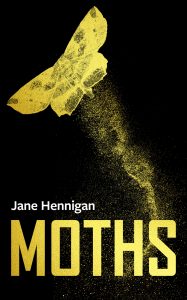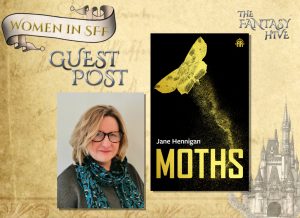Women Fighting Dystopia – GUEST POST by Jane Hennigan (MOTHS)
Women Fighting Dystopia
by Jane Hennigan
For me, growing up in the 80s, it was Sarah Conner and Ellen Ripley who fed my nascent feminism. I wanted my heroines fierce, firmly based in action, and with a large side order of I-don’t-care-what-you-think! Later, I came to appreciate a whole host of women fighting to bring down the tyrannical forces of oppression, ones that came with different risks and painful choices.
Katniss Everdeen, the Mockingjay, becomes a reluctant revolutionary, taking on President Snow and the Capitol of Panem in The Hunger Games series by Susanne Collins. She uses her exceptional hunting skills and tenacity to survive, sparking a rebellion that shakes the Capitol to its core. Her rebellion is initially seated in her need to protect her family but, over the three novels, transcends this to encompass all those oppressed by Snow, using not only her strength but also her sense of public opinion. When Katniss is being readied for her first Tribute Parade, being beautified to present her to the hungry eyes of the Capitol, Collins has her heroine eschew all the primping, not necessarily hating the dressing up as a bad thing in itself, but importantly that Katniss is forced to do it to be more palatable to those in power. Katniss soon strips herself of the costume and shows those watching the games a less cultivated version of a powerful warrior.
In contrast, Margaret Atwood’s unnamed narrator in The Handmaid’s Tale is forced into a far more subdued rebellion, playing out in the realm of the personal rather than the public. An acclaimed 1985 dystopian novel, it’s also recently been made into a BAFTA-winning TV series. Set in near-future New England, a Christian fundamentalist, theocratic, and totalitarian regime in the former United States has come to power. To deal with a plummeting birth rate, women have been made the property of the state – sexual slaves to bear children – lacking bodily autonomy.
 In such an oppressive regime, the heroine doesn’t allow herself to look further than surviving the next moment. Her resistance–in the novel at least–is a kind of self-preservation, a woman quietly clinging to her own identity and navigating her own morality with her agency cruelly curtailed. This makes her flight in the final chapters all the more terrifying. These days, with women’s bodily autonomy under threat, the Taliban curtailing women’s freedom in Afghanistan, and the looming spectre of Trump running for the top job once more it’s becoming uncomfortably and all too depressingly precedent.
In such an oppressive regime, the heroine doesn’t allow herself to look further than surviving the next moment. Her resistance–in the novel at least–is a kind of self-preservation, a woman quietly clinging to her own identity and navigating her own morality with her agency cruelly curtailed. This makes her flight in the final chapters all the more terrifying. These days, with women’s bodily autonomy under threat, the Taliban curtailing women’s freedom in Afghanistan, and the looming spectre of Trump running for the top job once more it’s becoming uncomfortably and all too depressingly precedent.
Laline Paull’s The Bees follows Flora 717, an unlikely heroine in a hive that values conformity above all else. She fights the totalitarian system by defying her designated caste in the hive. Her rebellion is not just against the rigid system but also the biological determinism imposed upon her. Born into the lowest class of her society, a sanitation bee, she is considered only fit enough to clean her orchard hive while living to accept, obey and serve. Yet Flora has special talents which take her all the way to the Queen’s inner sanctum. Here she discovers secrets both sublime and ominous.
The deconstruction of gender and class was a delight here, as was the uncanny science fiction feel, and insectile body horror. An honourable mention to an older gnarly bee, Lily 500, who imparts her wisdom to our heroine and then dies for the good of the hive. I may have had a version of Lily in mind when I created Mary, the protagonist in Moths. The Bees reminds me of both The Handmaid’s Tale and Frank Herbert’s Hellstrom’s Hive – a potent combination and an original dystopian perspective.
Dragons are having a welcome resurgence at the moment, and one such dragon-bonded heroine bravely fighting political powers whilst trying not to die is Violet Sorrengail. The Fourth Wing by Rebecca Yarros storms along with an abundance of energy, enthusiasm, epic world-building and vast amounts of sassy new-adult chutzpah. Twenty-year-old Violet is not a natural warrior. She’s shorter than average and has to contend not only with psychotic fellow students and wyverns (wyverns, oh yes!), but also a disability which makes her weaker than the average rider. Yarros describes Violet using a modified saddle to ride her dragon, with leg straps to mitigate her disability. And the romance, well… Sex, magic and violence. Never have so many pages flown by so fast.
Sapphic fantasy The Final Strife by Saara El-Arifi follows Sylah’s fight against a tyrannical caste system in a richly imagined world rooted in African and Middle Eastern mythology. It challenges many fantasy tropes, especially notions of the chosen one and ancient bloodlines, and offers a welcome alternative to world-building which is often heavily focused on medieval Europe. Its greatest strength, however, is how Sylah must battle, not only the dystopic system but a pervasive debilitating addiction to a drug derived from the Joba seed.
El-Arifi is relentless in showing the continuing effects of the drug and the consequences of Sylah’s choices – right to the final fight. The subject is explored in depth and Sylah’s relationship to the drug is described viscerally and realistically, both her psychological and her physical reliance. She still manages to stand up and fight despite her demons, and the story is all the richer for this inclusion.
The novels discussed here all highlight some of the toxicity which shot through my experience learning what it meant to be a woman. They reflect a familiar and insidious power imbalance – from motherhood to office dynamics to identifying and navigating the male gaze. Some of the women here are fighting regimes designed to control their womanhood – others are in the wrong place at the right time, however, when faced with oppression, they all choose rebellion. Each one resisting the constraints into which they were born.
Jane Hennigan was born and raised in Aldershot in Hampshire. After a decade working in E-commerce, she gained a degree in English Literature and Philosophy from Royal Holloway, and an MA in Creative Writing from the University of Surrey. She spent seven years teaching English literature undergraduates, before moving to the seaside to concentrate on writing.
Jane’s novel Moths is available now on Bookshop.org

